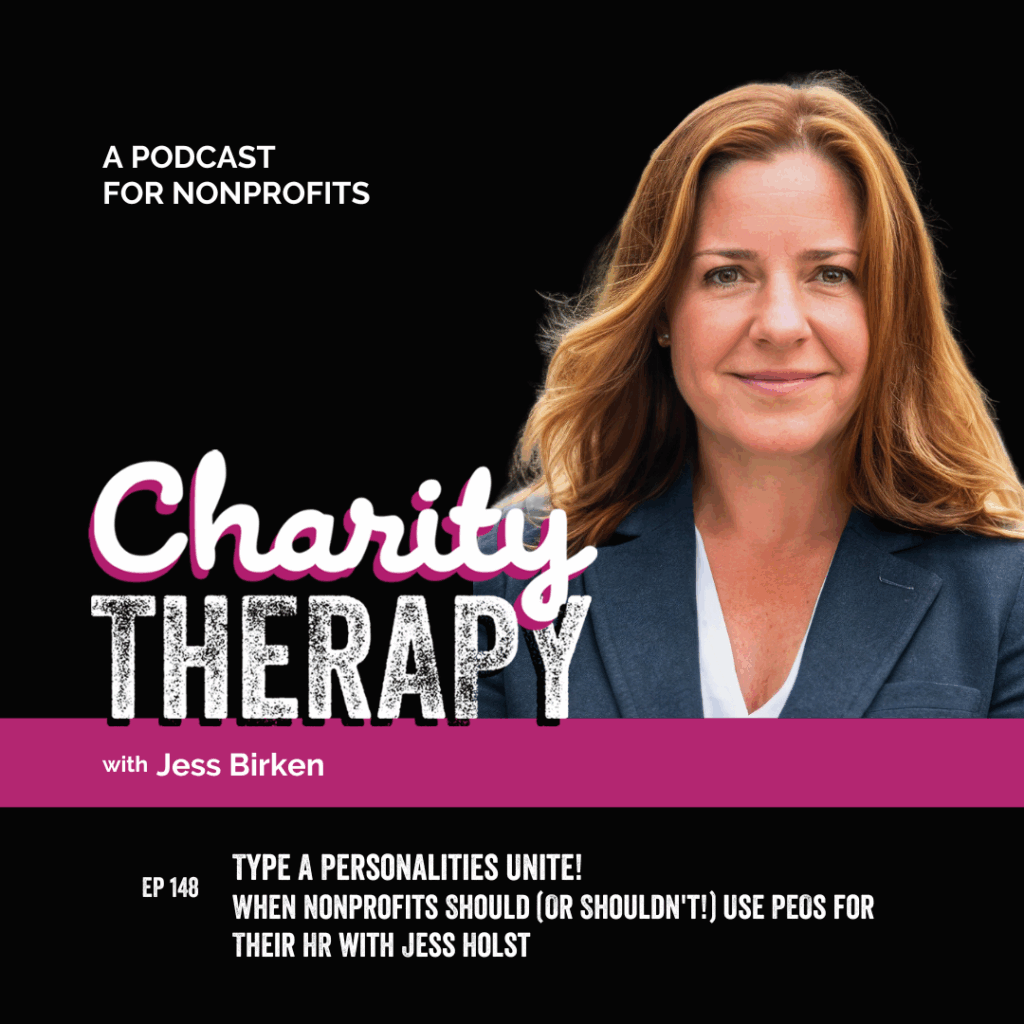Charity Therapy Podcast
151: Give Mark Your Crap! | When a PEO is a Good Fit for Your HR Needs with Mark Bromberg
Nonprofit HR can be messy — but it doesn't have to be. Let's talk about when it's time to call in reinforcements (and what "reinforcements" actually look like).
I sat down with Mark Bromberg, a Business Performance Advisor at Insperity and one of my favorite people to send clients to when HR headaches start taking over. We dug into what PEOs (Professional Employer Organizations) really do — and when they make sense for nonprofits.
Real Listener Question: "Our professional association has seven employees. We're losing our CEO soon, and our board wants to consider alternatives. When does it make sense to have a PEO instead of a CEO or in-house HR support?"
This is one of those big-picture nonprofit management questions that hits close to home for a lot of leaders. In this episode, Mark and I unpack what a PEO actually is (spoiler: not just payroll!), what a true co-employment model looks like, and why choosing the right PEO is more than a price comparison — it's a relationship.
We also talk about how post-pandemic remote work complicates HR, why private equity moving into the PEO space should give nonprofits pause, and what "due diligence" really means before signing a PEO contract.
What You'll Learn:
- What a PEO is — and what it isn't
- When outsourcing HR actually helps your nonprofit
- How remote teams across multiple states complicate compliance
- Why private equity's growing interest in PEOs matters
- What to ask before choosing a PEO (hint: "Who owns you?" is fair game)
- Why HR pros and PEOs can actually be a dream team
- How to make sure your PEO relationship is an ethical, cultural fit
Bottom line: Nonprofits don't exist to manage payroll, benefits, or compliance — you exist to change the world. The right PEO can help you do that, but only if you choose wisely and partner with someone who truly understands your mission.
Resources from this Episode
- Learn about Insperity: https://www.insperity.com/
- Connect with Mark on LinkedIn: https://www.linkedin.com/in/markbromberg/
- Previous Episode: GoFundMe Creates 1.4M Nonprofit Donation Pages Without Consent with Ephraim Gopin https://birkenlaw.com/charity-therapy-podcast/ct150/
- Episode Transcript: https://birkenlaw.com/wp-content/uploads/2025/12/CT151_Transcript.pdf
Connect with Us
- Jess Birken: https://www.linkedin.com/in/jessbirken/
Listen & Engage
- Listen on Apple Podcasts | Spotify | YouTube | Amazon Music
- Rate & Review on Apple Podcasts: Click "Ratings and Reviews" then "Write a Review"
- Send us your nonprofit questions: https://birkenlaw.com/podcast/#podcast-story
Stay Connected
- Sign up for the Birken Law Email list: https://birkenlaw.com/signup/
- Follow us on Facebook, Instagram, Twitter
Transcript
Jess Birken 00:00:02 Welcome to Charity therapy, the podcast where we explore the ups and downs of the nonprofit sector and answer your burning questions. I'm your host, Jess Birkin, owner of Birkin Law Office, and I'm excited you're here. Imagine hanging out with me and my super smart, funny, nonprofit expert pals. You get to ask them anything about your nitty gritty nonprofit life and get their wisdom for free. Whether you're a seasoned pro or just strapping on your nonprofit boots, we're here to share stories and remind you you're not alone on this journey. So get ready to join the conversation and bring me the tough question. I ain't scared. Ready to rock? Let's dive in. Hello and welcome back to Charity therapy. Today I am joined by my guest, Marc Bromberg. Marc is a business performance advisor within city, where he helps nonprofits with their human resources and administrative needs. One of my favorite people to refer clients to when they need help. Mark, thank you for coming on.
Mark Bromberg 00:01:04 It is my pleasure. Thanks for having me today.
Jess Birken 00:01:07 Absolutely wild times. I feel like I have sent you lots of nonprofits lately, and there's lots of things happening in employment law and HR and for employers all the time. I'm really excited to have you here because I work with a lot of smaller organizations especially, and they tend to get, let's say, creative with how they handle their human resources. And it's not always a great setup. And we had another guest recently who is like an a human resources professional, and she was talking about the drawbacks of using PCOS. And and she I was like, well, which POA do you like? And she actually was like none of them so far. And I was like, oh, that's a hot take. I need to invite Mark to bring in another perspective, right. So could you just before we dig in, could you give us like just a quick overview of what even is a P.L., a professional employer organization?
Mark Bromberg 00:02:06 So I guess the easiest analogy is most people are familiar with companies that come in and take care of all the computers in your office, and we're sort of all in this mental state where we go, okay, you know, there's cyber bad guys out there and the technology changes too quick.
Mark Bromberg 00:02:20 I can't keep up with it. So I'm going to hire someone else to handle that for me. We're the same thing, only on the HR side of things. People aren't really. They don't realize that labor laws and regulations are changing frequently as well. There are penalties, you know, for non-compliance. And people are, you know, human beings. And so if there are human beings or they make mistakes and some of the mistakes can interact, you know, can cause issues with other people, can impact the business. And so how you're dealing with them needs to be very clear. You have to be very careful in that regard. So we take care of all of that for our clients. And then things like Payroll and benefits are also relatively complex issues to. You got to make sure you get them right and we take you know, so taking all that off the plate allows our clients to focus on running their businesses, focus on strategic initiatives. And as we view ourselves, not as necessarily as an HR company, but as a strategic lever to help our clients grow.
Mark Bromberg 00:03:16 And big component of our lever is just HR strategies and HR tools. Yeah.
Jess Birken 00:03:22 Right on. Thank you for that. The piece about having benefits and having it done right is so key because, you know, most organizations, they're not there because they want to do HR. They're there because they're excited about their mission. Right. And it's like how do we get this mission done and all this the personnel management stuff is getting in the way of of mission work. So it's it's a good solution. I feel like for certain organizations. All right. With that, are you ready for today's listener question?
Mark Bromberg 00:03:55 I am.
Jess Birken 00:03:56 All right, let me do it. Let's do it. I'm the executive director of a professional association. We have seven full time employees. We've had the same CEO for years. But I just got word that the company is dissolving. I need to look for a new CEO. But my board would also like me to consider other alternatives. Is there any general guidance around when it makes sense to have a CEO versus other forms of HR support? While there we go.
Jess Birken 00:04:23 This is a good one.
Mark Bromberg 00:04:24 That is a good one. Let me start off with a line. It's not just a line, but it's what I tell anybody that I'm starting a conversation with. On paper, a CEO is the perfect business solution for every small to mid market company in the country. If not the world. Paper is not the real world and paper is not your actual operations. And so the you know, my job is to see is there a match between that paper perfection and what you have and if not, so be it. Let me direct you to, you know, use my knowledge, my network, to find the right path for you. So it might be that in that organization, they've reached a point where there are things that are happening, where bringing handling things internally is a better resource than having a CEO, usually for an organization of that size. However, having a CEO is the better solution because it's going to take care of, again, all this crap that they don't want to deal with the compliance issues, risk issues associated with having employees, all the administrative needs, and then you've got payroll and benefits.
Mark Bromberg 00:05:30 So the board is right in their position to be asking the question. That's what they're supposed to do. And I applaud them for saying, you know, hey, at this juncture, let's take a step back. Let's look and see what is the right path for us to take. I wouldn't just write off CEOs initially, nor would I write off going to, you know, doing it on your own initially. But I would use that opportunity to get more information. The CEO marketplace is very dynamic. There's there is money to be had here. And when there's money to be had, you get, you know, financial people looking at it. So a lot of smaller CEOs are being kind of bought up by private equity. And that has can have some serious impacts on things. And depending upon how things get timed and whatnot that could impact you. There are pros like asperity that are, you know, bit way larger than private equity is going to want to go in and buy because they're not going to be able to bundle it into anything that they can then sell.
Mark Bromberg 00:06:27 They're looking for smaller things to kind of create something of our size. So that's one of the things to be concerned about when you're looking is who are you looking to partner with? You want somebody who has size and gravitas, who has skin in the game, who has experience. It's, you know, they're dealing with your payroll and you want to make sure that they have, you know, if a mistake is made, they're going to be able to cover it, that there are certified PEO which is required at that point. So there are all of these little things that come into play, and whoever you're talking to, if you're doing your due diligence, should be honest enough with you to be able to answer all those questions and walk you down that path. Again, that path, I think that makes so much sense for the small businesses, for us, is we take care of the things that our clients don't even know, that they don't know. You're going to hire someone. The remote.
Mark Bromberg 00:07:18 They're in a new they're in a new city and state. Well, now you're dealing with all the withholding issues for that jurisdiction that's brand new to you. Yeah.
Jess Birken 00:07:27 And let me let me cut in there because this organization now they don't say where their seven employees are. But I'm working with so many charities now since the pandemic that there are a lot of remote people and they may be in 4 or 5 different states. And what this board may not realize is that when you have an employee in this, you know, you've got one in Maryland, you've got one in Kentucky, you've got one in Washington, D.C. you've got one in Michigan. Well, you now are an employer in all of those states. I've even had clients try and say, like, you know, we're a Minnesota company. So all of our employees, we report to Minnesota and I'm just like, what are you doing? Because federally, the Department of Labor is like, your employee works in the state they live in, which means your organization has to go register to do business in that state, get an unemployment insurance account in that state, participate in whatever, you know, their state mandated benefits, whether that's sick and save time leave or family medical leave like Colorado has.
Jess Birken 00:08:33 So this board may be thinking, oh, hey, we're paying all this money to a CEO, but we could do it ourselves. But have you really gone through even just the time and effort that's going to be required for your team to manage doing business and complying with all of those rules and regulations. I mean, just as a small law firm owner, I've gone through this and it's it's horrible. It's so horrible because there's no way, like, I don't care what payroll software you use, you still manually have to go register and you have to keep up all your things and you have to pay attention. And that doesn't even touch that. The employment laws are different in all of these places. And how you manage HR and how you accrue sick time and then you don't. That's not even getting to, like you said, municipal rules, which is a big thing lately. And then you may have different employees in different states where maybe weed is legal here, but it's not there. And how do you deal with that? And it can be an absolute nightmare.
Jess Birken 00:09:37 And this, this organ, this listener doesn't give us more details, but like, those are things that you need to pay attention to because it's it's not just, oh, we're we're paying a fee to CEO. I also I want to circle back to the thing you said about VC money moving into the PEO space. I had no idea that that was the thing that's happening. I mean, it makes perfect sense, but that's fascinating that private equity is coming in and acquiring PEO firms. And I don't know if folks have experienced this. Like I was going to a dermatology clinic for a while where I was like, okay, clearly venture capital has moved into this practice because I'm talking to somebody through an iPad because it's at a call center somewhere else. And like, it just I felt like cattle moving through the stations at the slaughterhouse, like I was just like a cog in a.
Mark Bromberg 00:10:33 If you wanted the doctor's office. Great analogy.
Jess Birken 00:10:35 Right? Right, exactly. It's like I'm just like a cog in a wheel of their profits generating machine now, rather than like a patient that's cared for.
Jess Birken 00:10:45 And I think that's a really key thing that I don't want to pass up on, that when people are considering a CEO, you should be looking beyond the brochure to figure out who actually owns this. Have they been acquired? Maybe do a little googling to find out if what you can, because that I didn't even know that was a thing and it makes perfect sense.
Mark Bromberg 00:11:07 Even googling you're going to find information and it's like anything else. You know, doctors hate Doctor Google because yeah, people read something and they think that they're an expert and just not understanding it. And I won't use any names, but there's a there's a pretty, you know, a decent sized CEO that was acquired. And they do pretty good work. Not as good as sincerity, but they do pretty good work. And it was also a certified CEO. And it came out a couple of weeks ago that they had lost their certification. Oh, now, if you dig a little deeper, yes, they did lose their certification, but that is because the CEO rolled them up Into one of the other POWs that they had purchased.
Mark Bromberg 00:11:47 Now, it might have been that they like the name of the other one better or whatnot, but basically that the legal entity that was, you know, Po one ceased to exist. So yes, it lost its certification.
Jess Birken 00:11:58 It's telling that they didn't even consider that as an important factor when merging the two organizations that they were like, yeah, whatever.
Mark Bromberg 00:12:09 Well, it didn't matter because they were they were going to they're basically moving the clients into the first, the secondary one, which is also a certified PEO. But, you know, if you're looking at this, you might say, oh, well, they're not it's not a certified peo. And you may have a, you know, during a time switch, it might be that you've got people in the field who were saying, I work with, I'm representing peo XYZ. And you know, you go and look them up. It's like, oh well, you just lost your certification when you, you know, the people who are on the feet on the street may not be getting all of the information, the timely information, because it's, you know, look, until things are official, we're not letting we're not making a big deal.
Mark Bromberg 00:12:44 We're not doing anything. So they're sort of at a loss. So even when you're doing your research, it can be a little a little difficult. Yeah. And you know so that's another reason when you're dealing with or working with larger entities, it's the information is going to be a lot more stable, particularly those that are, you know, filing your reports on a quarterly basis, you know, to Wall Street and, you know, because you can't really hide things there.
Jess Birken 00:13:08 Right, right. Another, you know, just relevant to the doing your research before selecting. I've definitely had clients where their mission area is maybe like a attractive to it's political. You know, I'm thinking like abortion clinics, women's reproductive health, trans rights, whatever. Like where they are attracting sort of like anti people. And their these clients are very concerned about data privacy and making sure that the providers that they're working with kind of have their back. Right. And so that's something to just to think about. If you're working with vulnerable populations or you are concerned about data breaches or people getting access to your inside, you know the name and address of where all of your employees live.
Jess Birken 00:13:54 That's something you want to bring up with your CEO. When you're like thinking through how are you going to work together? You know what happens if you get a request for information? Like there are some mission areas where really having a good relationship and not having it be like all we care about is the profit margin and reporting back to our shareholders. These things matter to a lot of nonprofits.
Mark Bromberg 00:14:18 Oh yeah. And so one of the things about it is we operate in a true co employment business model. So as far as the government is concerned, every one of our clients employees actually has I refer to it as a traditional household. You got two parents and then kids and they divide the parents, divide the work. Someone cooks dinner, someone cleans, and, well, while someone's whoever's cooking, the other parent is helping with the homework. And then while the other one's cleaning, the other parent helps with the, you know, bathe the kids. And you sort of, you know, you divide to conquer kind of thing.
Mark Bromberg 00:14:51 It's the same thing with us. We employ with our clients. So they're taking care of all of the issues surrounding who to hire, what the jobs are, how much to pay, who to who to promote, who to train, who to fire. All the administrative stuff will consult on it and help them. But the decisions are theirs. It's their business, their organization. We take care of the administrative and compliant type of things executing payroll, paying the taxes, etc. so as a result, every one of our clients, you know, one, they're also on the same benefit plan that I'm on. There's no difference. So our pool is about 400,000 people and they're viewed as, you know, your office came on, you would be viewed as an employee the same way I am. So we really protect that data because it's not like a request of we want the information for client X, and client X is a closed kind of thing. You're part of inspire and that there's there are lawyers who are looking to protect that.
Mark Bromberg 00:15:42 And someone's going to have to show up with a really good court order and a reason, because we're not going to be looking to give out information.
Jess Birken 00:15:50 Yeah. Love that. You know, it just occurs to me to like so many clients, you know, you're talking about payroll and and all the reporting and everything. So many clients I have talked to over the years, it's like, you know, they might be doing everything in a sense, their side of the, the, the co-parenting is going well. Like, their employees are happy, everyone's getting along, whatever. But so often a lot of that other side is neglected, let's say. Right. Like maybe they're not keeping all of the records. Maybe they're not documenting when somebody does have a problem and they should be documenting those things because it could spiral into something big or later, maybe they're personally signing payroll checks. Maybe their bookkeeper is in charge of sending in the employer tax. 941 forms. Like so many times I talk to people, we're like, but we just have five employees.
Jess Birken 00:16:47 Like, it's just like, we don't need all that. And I'm like, here's the thing, guys. It doesn't matter if you have 3 or 300. You you have to comply with all the rules and you might be really great at that one side of things where you're like doing the like day to day pep talks and management and getting the best performance out of people. But if the other side of the the coin isn't there, it can really cause problems because you're on the hook.
Mark Bromberg 00:17:17 Right in the and people kind of forget about certain aspects and it just I don't I don't believe this happens in the not for profit space. But let's say, you know, you had a really great fundraising year and you want to give everyone on your staff a $5,000 bonus at the end of the year. Well, depending upon how you do that, it's going to impact their their salary in one yo, your. Could be that your payroll provider is going to charge extra for running an additional pay run. Your worker's comp is going to get reallocated at the end of the year.
Mark Bromberg 00:17:44 It's going to get chewed up because your your weight, your wages changed. There's these all these little things that just start taking time away from what you really want to do. You didn't open your business to, you know, deal with this. You didn't form a not for profit to deal with this. And there are there are different solutions for that. I am involved with a not for profit. It was a husband and wife that they had one child. The child tragically passed away from brain cancer and they started raising money to fund brain cancer research. And they got to a size where they realized this is this has become a thing. And they had two choices. Either they hire someone to run it or they go to an association management company. Yep. And they opted to go to the association management company. And the they've grown. You know, it's now raising like 1.5 million a year. They're doing phenomenal stuff. Yeah. My brother in law was looking at the financial returns and it was like, you know, their administrative expenses are through the roof.
Mark Bromberg 00:18:43 I'm like, yeah. Because they're paying someone to do this. And then, you know, so there's a third party who's, who's taking money out of this. But if that third party wasn't there, this would be a charity raising $150,000. Now they're raising 1.5. They're able to give away 1.3. That's a net benefit. So it worked for them because now you know the husband and wife are still. They're still basically running things. But there's no staff. There's no nothing. They just they're the passion for which.
Jess Birken 00:19:14 They start raising, which is why they got involved in this. They didn't get they weren't inspired by their child's tragic death to look at payroll tax forms or whatever or whatever it is. That's just it's not why people are excited about the mission. And that's why I think a lot of times it gets neglected. You know, the kind of do is the bare minimum. I. That sounds rude, but it's. I don't mean it that way. It's just I know it's not the exciting part.
Jess Birken 00:19:42 Right. And so it tends to get sort of left out.
Mark Bromberg 00:19:45 Right. And then what ends up happening is that it comes back to bite you at some point in the future. And, you know, I was listening to some of your podcasts and, you know, you know, people like, you know, discovering it's like, yeah, I joined the board and I was asking about some of the forms they hadn't filed, though. Right. You know, their forms in five years. And so, like, what do they do? I'm like, it's no one wants to do that work. That's that's why we exist. You didn't be you didn't start anything to become an employer. You did it to, you know, to execute your mission, your desire, your your your your dreams. So let leave that crap as I call it to us. We'll take care of it for you.
Jess Birken 00:20:24 Oh, I love that. Okay, so I feel like we have some really good takeaways here.
Jess Birken 00:20:28 And I want to kind of, like, wrap them up and let's see if I hit everything that you think we hit. So first of all, you don't know what you don't know. And I know this is absolutely true for me. And I'm sure it's true for you. Mistakes can be expensive for your nonprofit, both in your relationships with your people and expensive to your organization's financial resources. And then secondly, to counter my good friend, the HR Pro Pos are still a great way to get your people benefits and have it done right, because sometimes you can't access those things on your own. And I think that's an incredible resource for a lot of nonprofits to be competitive in the marketplace of employees.
Mark Bromberg 00:21:15 Interject one thing on that. It's also belief that if you've got an HR pro, you don't need a CEO, and a CEO don't want to work with HR pros. And nothing can be further from the truth. Having a real HR Pro is part of the core team is the greatest benefit because now you've got somebody who's the quarterback internally.
Mark Bromberg 00:21:34 Yes. And the CEO basically becomes the entire rest of the team to execute on the strategy that that individual is coming up with. And so now they've got advisors and then they've got people. Then they and they have foot soldiers. And that's a critical thing to remember.
Jess Birken 00:21:52 Yeah. So let's let's add that in there in the list that fractional HR or full time HR but fractional HR and a CEO is a winning combination. Yep. And then the big one. Choose wisely. Yes. People have bad experiences with CEOs. Pos are on the radar of private equity. There are bad experiences out there. You need to choose wisely. And so when you're choosing, you know, look and make sure they're certified. Look and see if they have that true co employer model where you are dividing the labor. Like parents with kids find out if you can whether they've been absorbed by private equity and are just trying to squeeze every last sent out of you and skip the customer service. And then I think I like your last sort of nugget, which was like, leave, leave the crap for us to deal with.
Jess Birken 00:22:44 Ultimately, nonprofits, especially smaller nonprofits, but even mid-sized ones with big staff. This is not why you exist. You don't exist to do all these administrative things, and it's not what anybody's excited about. So leave the crap for people like Mark. Give Mark your crap. Okay. Anything that you think we missed.
Mark Bromberg 00:23:10 Anything else I think we've missed? No. Not really. You know it. Do your due diligence. Actually, no. There is. One thing is you want to make sure that it's a culture fit. If, you know, like anything else. It's it's there's personalities. You're going to be engaged with the people ask to don't just talk to the person who's trying to sell you on the the the service. Yeah. Ask to speak to people in the service team. They're the ones who are going to be taking care of you long term anyway. You know, asked to speak to clients? Yep. Don't be. Don't be alarmed if they look at you and say, that'll be the last step, because, you know, you want to protect, you know, people's time.
Mark Bromberg 00:23:45 They're not they're not a client to be a reference 24 hours a day. Right. But as a final step, you know, that's a perfectly appropriate thing to ask. So. And again, it just, you know, it. Do your due diligence. Yeah I love that. Like, with anything else.
Jess Birken 00:24:01 Exactly. Yes, exactly. It's a big decision. Take it seriously. Okay. Mark, thank you so much for joining me for point Counterpoint on Pose. If folks would like to connect with you online, where can they find you on the interwebs?
Mark Bromberg 00:24:20 On the interwebs? So one, I'm on LinkedIn. That's an easy place that anyone, if you don't remember any of the other details. They can find me at Mark Bromberg. And that's that's the other place. And I'm happy to answer any questions that people have.
Jess Birken 00:24:35 Awesome. Well, folks, you heard it here first. Mark's email is available to you now. If you enjoyed this episode. Look, do me a huge favor.
Jess Birken 00:24:47 Share it with a friend. If you are part of a non-profit that you know, like their kind of employment compliance is maybe a little out of whack. Make a recommendation. Have them consider a P.O. And share this episode with them. Leave us a rating a comment on your podcast app. It really does help people find the show. And if you have a question or a story to share, I would love to hear from you. Send me a note online at Charity Therapy Show. And thanks, as always for listening.
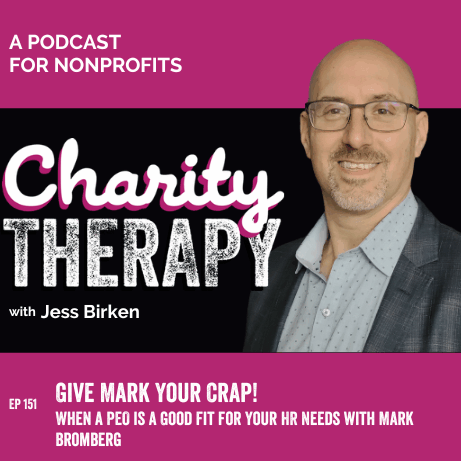
Recent Podcast Episodes
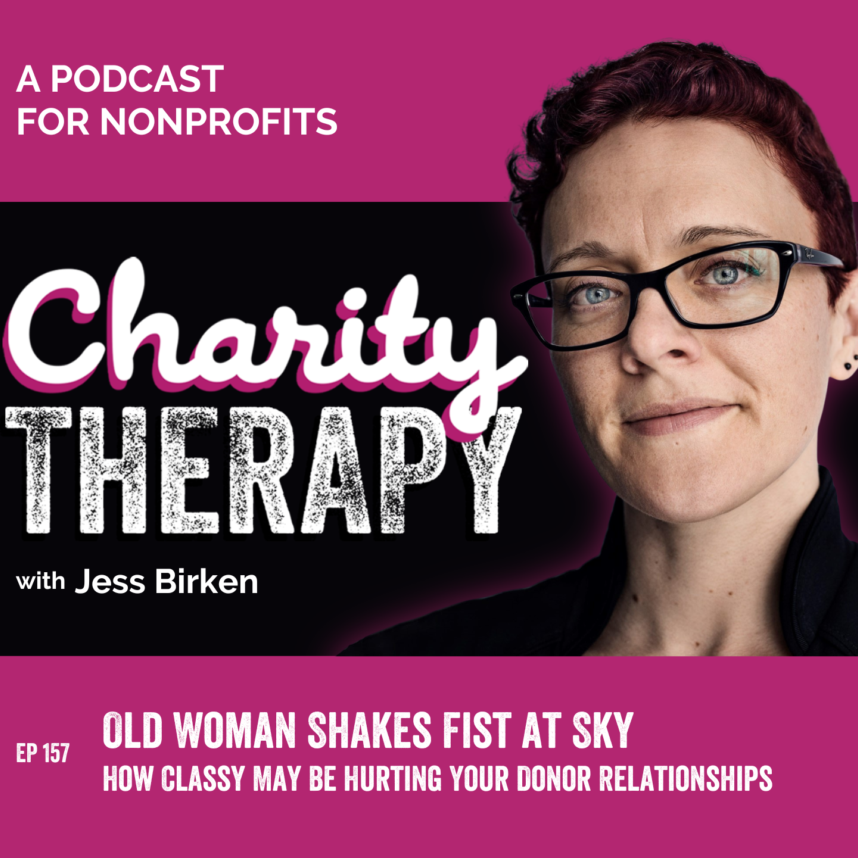
157: Old Woman Shakes Fist at Sky | How Classy May Be Hurting Your Donor Relationships
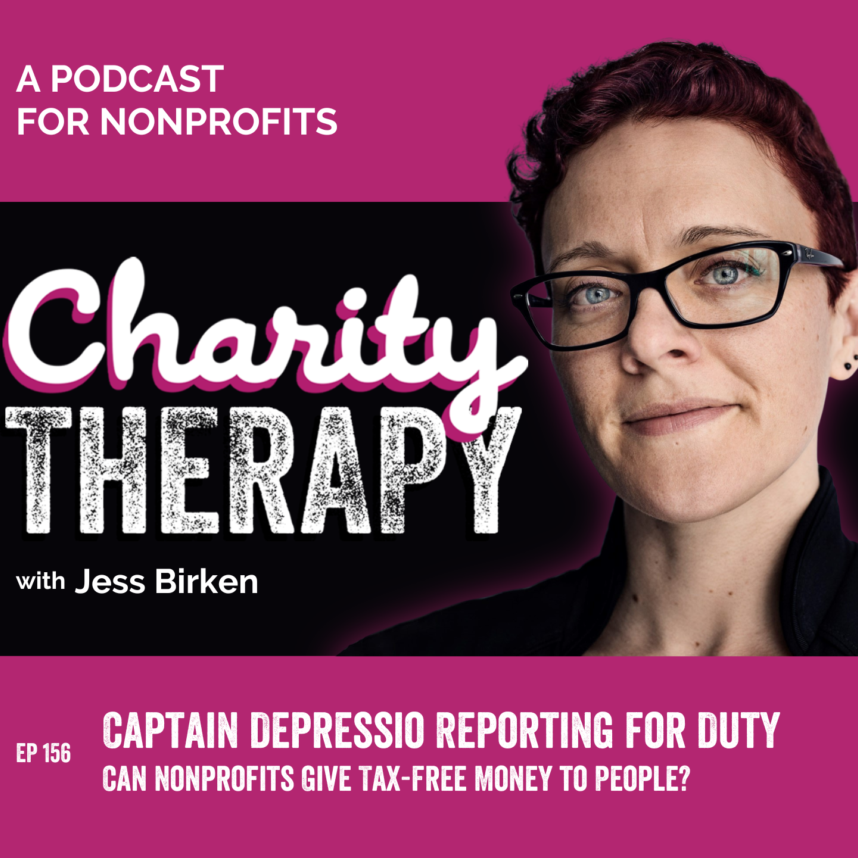
156: Captain Depressio Reporting for Duty | Can Nonprofits Give Tax-Free Money to People?
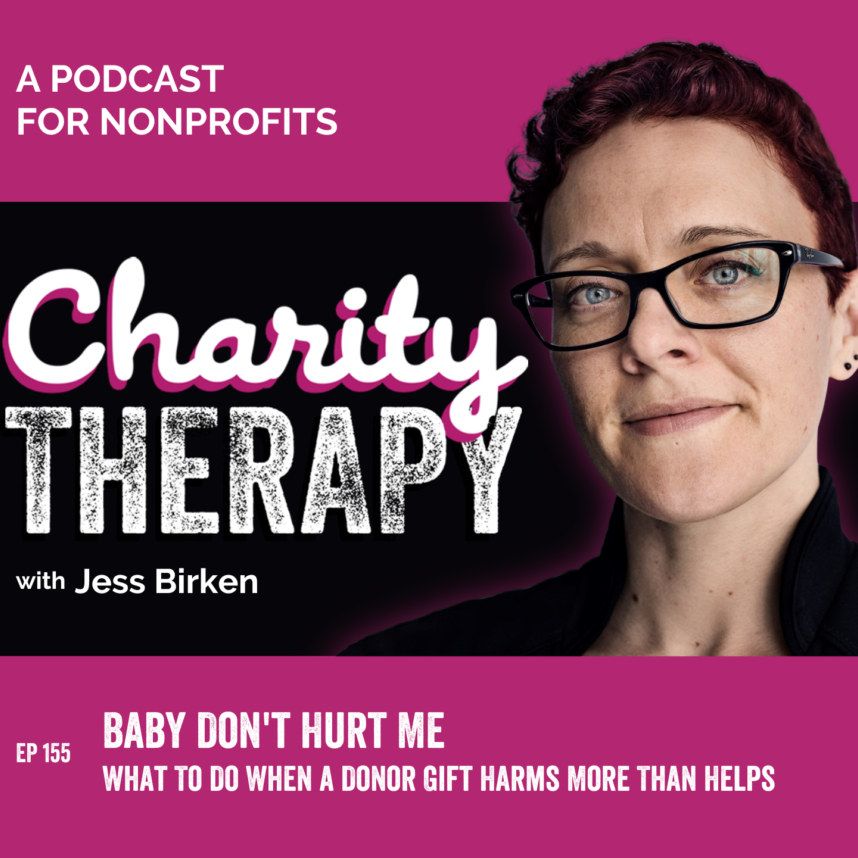
155: Baby Don’t Hurt Me | What To Do When a Donor Gift Harms More Than Helps
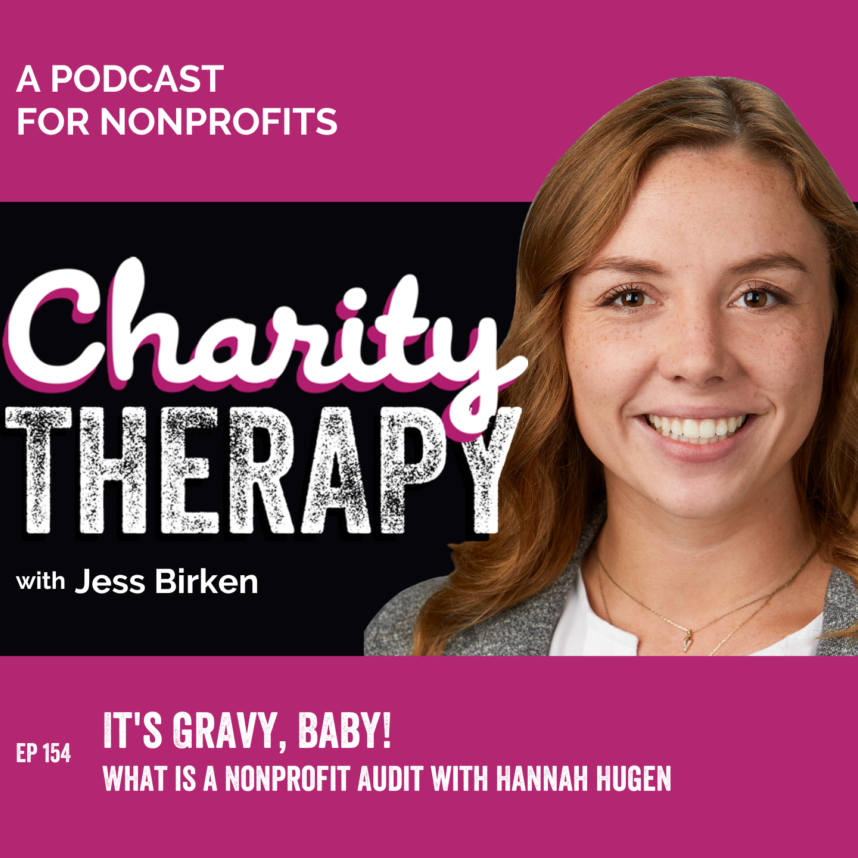
154: It’s Gravy, Baby! | What is a Nonprofit Audit? with Hannah Hugen
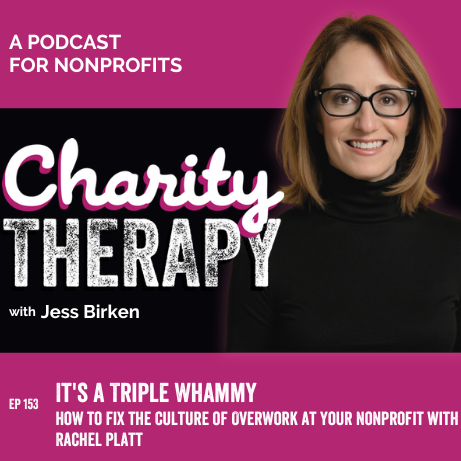
153: It’s a Triple Whammy | How to Fix the Culture of Overwork at Your Nonprofit with Rachel Platt
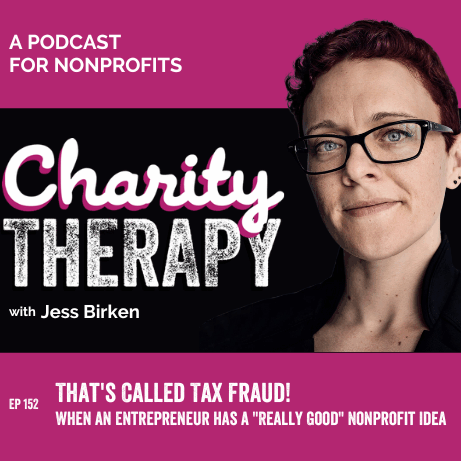
152: That’s Called Tax Fraud! | When an Entrepreneur has a “Really Good” Nonprofit Idea
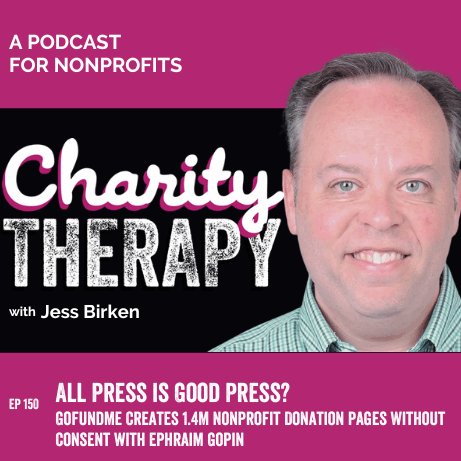
150: All Press is Good Press? | GoFundMe Creates 1.4M Nonprofit Donation Pages Without Consent with Ephraim Gopin
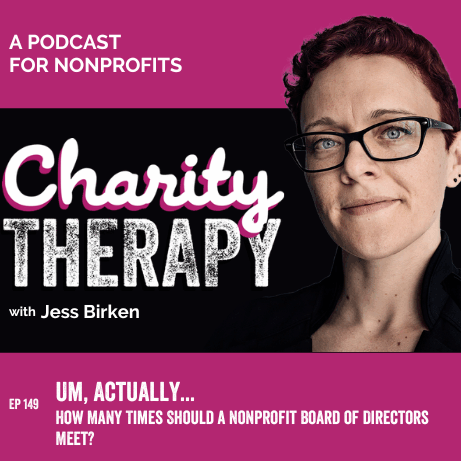
149: Um, Actually… | How Many Times Should a Nonprofit Board of Directors Meet?
